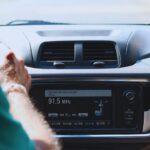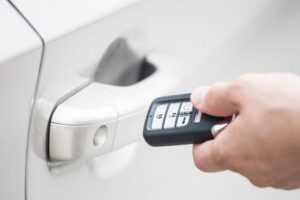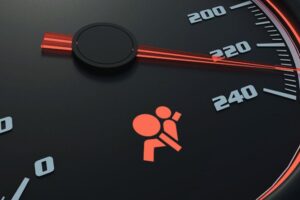Having a car that doesn’t start when you need it is the stuff adult nightmares are made of. There’s nothing like heading out your door ready to take on the day only to find your car won’t turn over, even though it has power.
Most of the time, when a car won’t turn over, it’s the battery. But if your car still has power, the problem is not likely to be with the battery. However, the battery sometimes has a lower capacity to hold a charge. You can also check for a dead alternator, a faulty starter system, or a malfunctioning fuel pump.
Read on to learn more about finding out what is wrong with your vehicle when it won’t turn over but has power.
Why Your Car Won’t Turn Over But Has Power

Assess the Situation
When something goes wrong with your car or engine, you first want to assess the situation. Sometimes, you can narrow down the options by considering the age of your vehicle. For example, if the car is barely a year old, it’s probably not a fuel injection issue.
But it could be anything for older cars, especially if it hasn’t been started regularly for some time. It could be electrical, the battery, or any number of other problems. Let’s take a quick look to narrow down what could be wrong with your car.
When your car doesn’t start, you know it has power; many things could be wrong. Take a minute to think about what happens when you crank the car.
What Happens After You Put Your Key in the Ignition
When you put your key in the ignition and turn it, the battery sends a charge to the starter motor, and that causes the crankshaft to rotate. At the same time, the fuel pump engages and sends fuel from the fuel tank through the fuel lines, the injectors, and into the engine.
Air enters through the air filter and travels through the intake manifold before reaching the engine. The distributor uses spark plugs to send sparks to the gasoline engine.
This spark ignites the air/fuel mixture and powers up the engine. A problem in any of these steps can cause the engine to fail to start. Let’s look at each of these operations to see what might be wrong when your car won’t start.
Top 4 Reasons Why Your Car Won’t Start When It Has Power
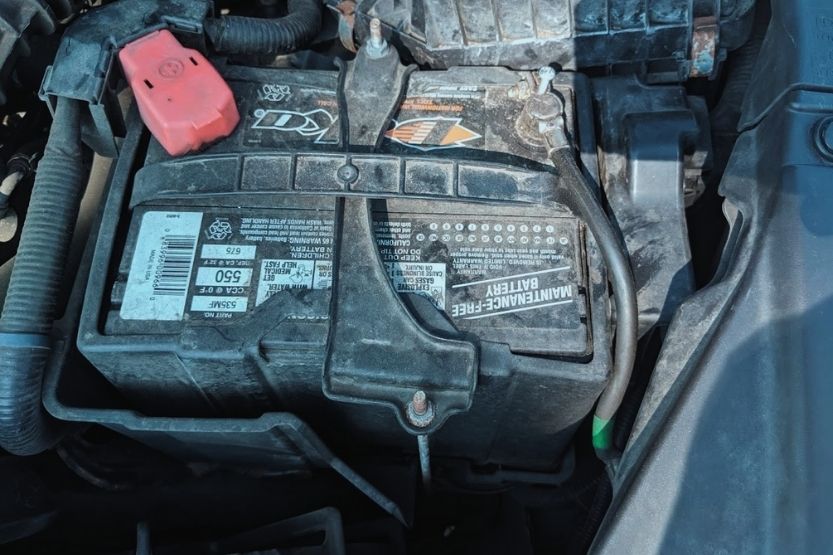
1. Battery and Ignition System
Weak or Old Battery
Since you know your vehicle has power, it’s not likely a dead battery, even though this is a common problem. Without power, the electrical system will not work.
If your battery is weak, you will have dim lights. An old battery may not be able to provide enough power to start the car, even though there is little power present.
If the battery is more than four years old, you may want to try changing it out with a new one before troubleshooting. Also, a quick voltage check can alert you to the strength of your battery. It should measure at least 12 volts of power.
Alternator Malfunction
The alternator gets power from the engine and keeps the battery charged while running. It is an essential part of the electrical system, and if it malfunctions, the car may not start. An alternator that cannot keep the battery charged will cause the car to die.
The electrical system will quickly drain all the power from the battery. The car will have power, but it may not have enough to start it.
How to Check the Alternator
If the alternator is not working, you may be able to jumpstart the car. Then, you can measure the voltage on each of the battery terminals.
If the alternator is working properly, the voltage should increase when you rev the engine. If there is no increase in voltage, the alternator is not performing its job.
The alternator can have different issues from the coil, which converts the rotating motion of the engine into the current, to the rectifier, which converts alternating current into direct current. A trained mechanic can diagnose this problem. They can also replace the alternator properly.
Problems with the Starter Motor
Another element in the ignition circuit is the starter motor. It is connected directly to the engine’s crankshaft. The ignition circuit rotates the crankshaft.
If the starter motor fails, your car will not start, even though it has power. To determine if it’s the starter motor, turn the key and see if the engine cranks. If there is no cranking, it’s likely the starter has failed.
Fuses and Wiring Issues
Before you go out and start replacing parts, check your car’s fuses. If the ignition fuses are blown, simply replacing fuses can fix the problem.
However, you’ll still want to diagnose what caused the fuse to blow. Wiring harnesses can create issues too. Sometimes, rats or other wild animals that have access to your vehicle can chew on the wires.
Once a wire is chewed up, it can disconnect many of your vehicle’s components. Even if the battery and starter motor are in great shape, a severed connection can prevent them from working.
Cut wires can create an electrical short that blows a fuse. It can create a fire hazard. Make sure there are no damaged wires or blown fuses.
2. Problems with the Fuel System
The fuel system provides the engine with what it needs to run by sending gasoline or diesel to the engine.
If your car won’t start but has power, the culprit could be a malfunctioning fuel system. You’ll want to check the battery and ignition system first. Then if they are working properly, check the fuel system.
Faulty Fuel Pump
Newer cars do not usually have problems with their fuel system. Your fuel system should be okay if you drive your car regularly and keep it filled with gas or diesel. However, a vehicle may come from a factory with a faulty fuel pump.
Also, older vehicles can tend to have problems with the fuel pump. Fuel quality can also be a factor in keeping fuel systems in good shape.
How to Check Fuel Pump’s Condition
Checking the fuel pump is not difficult. When you turn the key in the ignition just before the engine cranks, you should hear a hum coming from the back. That would be the fuel pump.
The pump begins the flow of fuel before the car starts. If the fuel pump is faulty, this won’t happen. The engine will not get the fuel it needs to start.
When you turn the key and don’t hear the slight hum, you may have an issue with the fuel pump. A technician can inform you if you need a new fuel pump or if it is just clogged.
Fuel Line Problems
The fuel pump may be working properly, but the fuel will not reach the injectors without enough pressure. A clogged fuel line can keep your car from starting.
Some fuel systems have a Schrader valve on them that lets you test the fuel pressure. If it is low, a mechanic can diagnose and fix the problem. Please note that this is usually an issue found only in older cars.
Failed Fuel Injector
It is not a common problem, but sometimes fuel injectors fail. If your car has a four-cylinder engine, you have four fuel injectors. All of them would need to fail to keep the engine from starting.
How to Check Fuel Injector’s Condition
So, it’s scarce, but it is possible. Suppose you know how you can check the fuel injectors yourself. Press a flathead screwdriver into each one and listen for it to click with the engine cranks.
A click means it is working properly. If they did happen to fail, check the throttle position sensor. Remove it and see if the engine starts. If the car starts with the sensor missing, it needs to be replaced. It is a good idea to clean your fuel system regularly.
Again, a car won’t turn over but has power – what are the causes? Usually, the battery has problems if your car won’t turn over. Your battery may have a lower charge retention capacity.
3. Failed Air Intake System
Your air intake system will rarely fail and keep your car from starting. But if your vehicle will not start but it has power, it may not be getting the air it needs. The air supply is essential for your engine to be able to burn fuel. If there is not enough air flowing, the car won’t start.
Clogged Air Filter
Occasionally, a clogged air filter can keep an engine from starting. If the air filter is clogged, it is easily replaced. Sometimes, animals build nests in an engine, or debris gets in the filter and causes a clog. But if it looks clear, it’s probably clear.
Bad MAP or MAF Sensor
The manifold absolute pressure (MAP) sensor or mass airflow (MAF) sensor measures the pressure and volume of air pumped into the engine.
If these sensors do not work, the engine will get an error reading and fail to start. Unplug them and start the car to see if the sensors are causing a problem. If it starts, the sensors need to be replaced.
4. Spark Ignition System
If your car runs on diesel, you will be able to skip this section. But most cars run on gasoline, and when they don’t start, it can be due to a spark issue. The gasoline system needs a spark ignition. What could go wrong?
Distributor or Ignition Coil Issues
The distributor and ignition coil are important parts of a car’s ignition system. If they fail, the engine won’t get the spark it needs to start. A trained mechanic can hand-check these elements to make sure they’re working.
Faulty Spark Plugs
The spark plugs are responsible for igniting the fuel injected into each cylinder. Over time, they wear down. This leaves the engine without sparks needed to burn fuel.
How to Check Spark Plug’s Condition
Even though there’s nothing wrong with its power, the car won’t start. Spark plugs remove easily. Once they have been removed, check them for cracks or clogs.
The spark plugs’ ceramic area can crack and compromise the insulation, so it no longer works. Check the tip also to see if it is clogged up with debris. If a spark plug is clogged or cracked, it needs to be replaced. Replacing spark plugs is part of your vehicle’s routine maintenance.
Watching them ensure they are in good shape helps keep your engine in good running condition.
Car Won’t Turn Over but Has Power: How to Fix
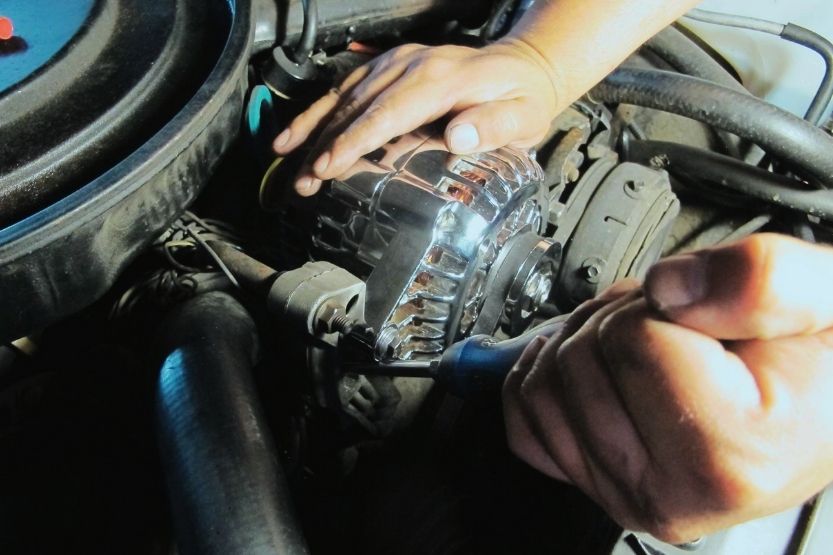
The battery is usually the culprit for new engines if it fails to start. Even if the car has power, it can still be the battery if it is weak. It’s not totally out of the question.
A dead alternator is also very likely the problem. Remember that even if there is power, it doesn’t mean the battery is healthy. It can be tricky since lights and horns don’t take much power to work. On the other hand, the starter takes more power than the lights or stereo.
The most common problems like a battery or alternator are quick and easy fixes. They don’t need any special tools and are quick to replace. But a mechanic has to diagnose and fix other issues like the fuel system, air intake, or ignition system.
You can certainly narrow down the options with some basic knowledge and a few tips. But for a proper diagnosis, you may need a skilled technician. You can at least have a good idea before going to the garage or talking to a mechanic.
Frequently Asked Questions
Why Is My Car Getting Power but Not Starting?
Your interior lights came on when you got in your car doesn’t mean the battery is working properly. You may notice some items that seem to have power. Some items like lights, the horn, and the radio don’t take much power from the battery.
But starting the engine takes a lot more power. If power is low but present, it may be that the battery is just too weak to start the engine.
Why Is My Battery Fine, but My Car Won’t Turn Over?
Your battery doesn’t have to be dead for your car not to start. Other issues with the battery, like loose cables, corroded connectors, or issues with the alternator or starter, can prohibit your car from starting properly.
How Do I Tell If It Is the Battery or the Alternator That Is Not Working?
If your engine doesn’t start, you can try jumping it. If it starts up with a jump-start and stays running, but then later it won’t start, it’s likely an issue with the battery. But if the car starts with a jump and immediately dies, it is more likely a bad alternator.
How Do I Tell If the Starter or Battery Isn’t Working?
The battery uses energy to turn the engine over and get the vehicle started. If you place the key in the ignition but hear just a clicking sound when you turn the key, it’s likely the starter system that isn’t working properly.
What Causes a Car Engine Not to Turn Over?
Many things can prevent a car from starting, including a dead or dying battery, bad cables, an issue with the starter, or a bad alternator. It can be difficult to determine a single cause.
Conclusion: Car Doesn’t Turn Over Despite Having Power
Usually, when you find out your car won’t turn over, but you know it has power, you first suspect the battery.
However, since the car still has power, you should think beyond the battery when troubleshooting to figure out why your car’s engine isn’t turning over. But just because the car still has power doesn’t mean the battery is in good shape either.
It can be disappointing and frustrating. You need it to perform one task, and it fails. You may feel powerless and stuck. But most of the time, it’s a simple mechanical problem which means a little troubleshooting can help you discover the problem.
When your car doesn’t turn over like you expect it to, it’s usually a hitch in one of the car’s main systems. It may be as easy as replacing an alternator, the starter, or the fuel pump.
A mechanic can inspect your vehicle and ensure the correct part is replaced. Hiring a professional helps ensure the car is fixed right.
Read next:
How to Fix Car Having Trouble Starting
What to Do When Car Won’t Start but Radio Works
What Would Cause a Car to Die While Driving and Not Start?


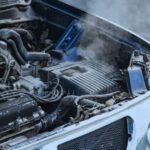
![Brake Lights Won’t Turn Off [Causes and How to Fix] brake lights wont turn off](https://roadsumo.com/wp-content/uploads/2021/05/brake-lights-wont-turn-off-150x150.jpg)

